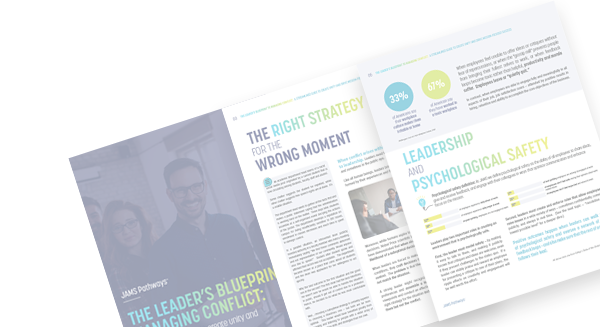News & Insights
BROWSE TOPICS
How To Navigate Political Speech At Work
KEY POINTS

Because 2024 is an election year, employers have been asking for advice on how to handle potentially divisive political discussions at work. After all, unless the place of employment is a campaign headquarters, the editorial section of a news organization, a political think tank or a similarly situated workplace, the mission of the organization is probably not intrinsically political.
What Are the Rules and Policies?
Some workplaces have rules and policies regarding political discussions and political speech—including dress codes, because a T-shirt with a political message speaks as loudly as an oral communication. Others have implied rules, usually based on existing policies in an employee handbook or code of conduct. And still others have no explicit rules, preferring (or defaulting to) handling each situation on a case-by-case basis.
The Legal Framework
Employers have the ability to regulate workplace conduct so long as the regulation doesn’t run afoul of the law. We all know that the First Amendment right to free speech doesn’t confer the right to shout “fire” in a crowded theater and that speech can be abridged based on considerations of time, place and manner.
But that still leaves open a thorny question: When does a statement cross the line from permitted conversation to political discourse?
Navigating the Gray Areas
I’m a former law professor, and we are trained to create difficult hypotheticals. If you’ll indulge me, I’m going to do that now.
Suppose there’s a Category 4 hurricane that strikes an American city and causes significant damage. I don’t think anyone would have an issue with an employee who said, in the breakroom over coffee, “Did you hear about that hurricane?” Similarly, I think there’d be little issue with saying “The Boston Celtics won the NBA championship” or “There’s a new Aliens movie coming out and the preview looks scary.” Objective facts are just that: facts.
But what happens if the fact is political in nature? “President Biden withdrew from the 2024 election.” “A candidate for office said ‘X’ yesterday.” “A new poll came out showing that a [candidate/policy/law] is on the [upswing/downswing].” Are these just facts like the weather, sports or entertainment, or are these political statements?
Here’s another. I doubt it would be controversial if a colleague asks a co-worker if they have weekend plans and the response is “I’m going to go fishing” or “I’m hoping to do some yardwork and catch a movie.” But what if the true answer is “I’m going to help organize a political event [in favor of/in opposition to] a [candidate/policy/law].” Is this an objective statement or a political one?
Here's one more. A colleague tells a co-worker about a law permitting or banning an activity. In one instance, the co-worker is unaffected by that law or activity, and in another, the co-worker is immediately and personally impacted. Does it matter whether the speaker knew that the statement would have a harmful impact? Do we care more about intent than impact? A statement about an “objective fact” may be neutral to one person but hurtful or distracting or worse to another.
Law professors use these hypotheticals to show that while there may be some black-and-white situations regarding political speech at work, almost every one of those situations creates a gray area in which the answers aren’t obvious. Judges are often called upon to rule on situations that hew close to those non-obvious lines; and in the case of speech at work, so are employers and supervisors.
Effective Conflict Resolution Strategies and Third-Party Interventions
At JAMS Pathways, my colleagues and I are devoted to helping resolve workplace conflict efficiently, effectively and with a keen eye on maintaining our neutrality. We are focused on helping resolve intra-organizational conflicts at the lowest possible level in ways that help these organizations (schools, medical facilities, nonprofits and many other businesses and entities) maximize the outcomes intrinsic to their mission.
What we’ve learned in our workplace conflict resolution sessions is that context matters. Consistency, clarity and transparency matter. Being able to separate productive “task conflict” (where people share different views of how to best attack a thorny work problem) from unproductive “relationship conflict” (where people are bruised and resentful and may checked out from or become distracted from their job) matters. And we’ve seen time and time again that the intervention of a skilled third party can help organizations navigate conflict effectively through even the most difficult discourse.
As the political season heats up, a wise employer will know that there won’t always be easy answers to hard questions. Sometimes the best response to workplace conflict is to hire experienced professionals to help an organization transcend the problems created by speech and action that approach the line between what’s OK and what’s not.
So, batten down the hatches and get ready for an interesting next few months. We’re here if you need us.
This page is for general information purposes. JAMS makes no representations or warranties regarding its accuracy or completeness. Interested persons should conduct their own research regarding information on this website before deciding to use JAMS, including investigation and research of JAMS neutrals.

Start Your Journey Now
Book a Free Discovery Call
Book a discovery call today.
Customized Client Solutions
Download our streamlined guide
The Leader's Blueprint to Managing Conflict
In this practical, step-by-step playbook, our experienced facilitators explain how to efficiently resolve workplace conflict to create unity and drive mission-focused success.



